Faculty
We are currently a proud group of 41 full-time faculty dedicated to the pursuit of excellence in pulmonary & critical care medicine, with a focus on clinical, bench, and translational research, medical education, systems and quality-based improvement, and leadership in hospital administration.
Just as the field of Pulmonary and Critical Care is broad in scope, so are our faculty diverse in interests. From full-time intensivists to interventional pulmonologists to NIH-funded researchers (and many of us still trying to do and have it all!), fellows can find a willing guide in virtually any aspect of our field.
Program Director
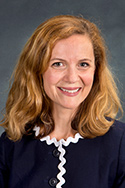
Mary Anne Morgan, MD
Associate Professor of Medicine
Program Director, Pulmonary & Critical Care Medicine Fellowship
Clinician Educator
I enjoy the spectrum of pulmonary and critical care and care for patients both in the ICU and in the outpatient setting as in general pulmonary medicine as well as in my role as Director of the University of Rochester’s Lymphangioleiomyomatosis Clinic. I feel honored to be involved in the lives of my patients and the trainees at URMC.
Education is my primary non-clinical passion. My favorite hours of the week are spent debating cases, identifying pitfalls in reasoning, and learning from my colleagues and trainees in Internal Medicine resident morning report and in our many PCCM conferences. I am grateful to be an eternal student.
In my free time, I am a voracious reader, an avid outdoors person, a (very) amateur knitter, baker, and jam-maker, and a yoga enthusiast. I am also the mother of two rambunctious boys and two rambunctious dogs.
Fun Fact: Hiked, machete’ed, and canoed 350 miles across the Arctic Circle with five friends and no GPS. “Starved” for 2 days. Had a close encounter with a musk oxen (they do smell musky). Came home with unintentional dreads and a renewed respect for Mother Nature.
Associate Program Director
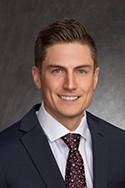
Patrick Donohue, MD
Assistant Professor of Medicine
Associate Program Director
Pulmonary & Critical Care Medicine Fellowship
I love that a career in pulmonary and critical care medicine has so much to offer. I am honored to treat a diverse group of patients across many clinical environments including the MICU, outpatient pulmonology clinic, and the inpatient pulmonology consult service. This field offers the opportunity to solve complex problems and to work on complex teams. While there is so much to be grateful for in this field, one of the most rewarding aspects is the privilege of working alongside such exceptional colleagues.
While I practice critical care medicine and general pulmonology, my clinical focus is in asthma and other airways diseases. The diagnosis and monitoring of asthma is of special interest, particularly the application of the promising technique of oscillometry. In addition to my clinical practice, I am a medical educator and passionate about improving pulmonology training across all levels of medical training. I am fascinated with the potential of integrating more technology into our pulmonology curriculum, as well as developing innovative approaches to teaching pulmonary medicine.
Outside of work, I enjoy spending time with my family exploring all there is to do in the Rochester area. In addition to running, biking, hiking, and kayaking in so many of our local green spaces, we love going to festivals, live music, breweries, and wineries. I am a lifelong Buffalo Bills fan, so apologies in advance for any emotional instability during football season.
Core Fellowship Program Faculty
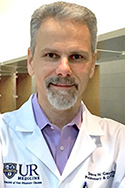
Steve Georas, MD
Professor of Medicine
Director of Fellow Research
Director, Pulmonary Function Laboratory
Co-Director, T32 Research training Grant
Physician Scientist
We recognize that most of our fellows don’t have extensive research experience when they come to our program. The ample protected time for scholarship allows them to take ownership of a project that is both feasible and tailored to their interests. In my experience, pulmonary fellows have the most success at research when they take a “deep dive” into a given research project, and persevere despite the ups and downs that are inherent in any scientific endeavor.
I moved to the University of Rochester in 2006 because of the great opportunities available for a physician-scientist like me. I was really impressed with the quality of our fellows and housestaff: some of the brightest young minds in academic medicine I’ve encountered in my many years of educating trainees I was equally impressed by the camaraderie in the faculty in our division.
I have a long-standing research interest in understanding mechanisms of allergic airway inflammation in asthma. I’ve been fortunate to mentor a number of fellows, a collaboration that has continued as some of moved to other institutions.”
Surprise fact: Speaks fluent Greek.
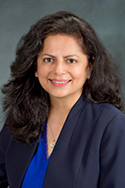
Sandy Khurana, MD
Professor of Medicine
Medical Director of the Mary Parkes Asthma Center
I moved to Rochester in 2008 because I felt that URMC could provide me the opportunities to grow as a clinician, educator and scholar. I was particularly drawn by the collegial and collaborative environment in the Pulmonary & Critical Care division. Over the years I have grown to love Rochester as home. It is the perfect-sized city with a great community, excellent restaurants, outdoor spaces and art.
My clinical practice is primarily focused on management of severe and difficult asthma. I am the medical director of the Mary Parkes Center, one of the main outpatient sites for URMC pulmonary practice, which houses our excellent asthma biologic program. My clinical research focuses on application of new and advanced therapies in asthma. I am the past chair of ACCP’s Airways Disorders Network, faculty at CHEST meetings and courses, and a CHEST Board of Regents member. When I am not immersed in the wonderful world of asthma, you will find me seeking good food, great company and places to travel.
I think that the URMC PCCM fellowship provides a nice balance of clinical and research training. Many unique and interesting research opportunities are available to our fellows, ranging from basic science to clinical and outcomes research, in almost all aspects of pulmonary and critical care medicine. With protected research time and strong mentorship, our fellows have done well in whatever field they have chosen. My advice is to start thinking about research early in your fellowship, consider what interests you and don’t be afraid to go outside your comfort zone.
Surprise Fact: Never one to shy from a challenge, her very first experience hiking was completing the arduous Inca Trail.
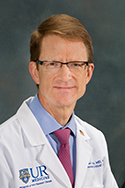
Michael Nead, MD, PhD
Associate Professor of Medicine
Clinical Director, Pulmonary & Critical Care Medicine
Medical Director, Interventional Pulmonology
Broadly speaking, my interests involve all things bronchoscopy, with some pleural disease work as well. Much of my work involves advanced diagnostic procedures, whether endobronchial ultrasound guided biopsies or navigational bronchoscopic techniques. On the therapeutic side, I enjoy solving complex airway issues to improve a patient's quality and quantity of life.
A unique level of satisfaction comes when working with a motivated adult learner who asks probing questions while actively striving to improve their skill at something. I think a fellow's opportunities at URMC are limited only by their imagination and motivation.
Surprise fact: Expert telemark skier.
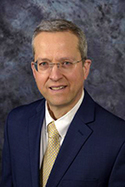
Anthony Pietropaoli, MD
Associate Director, Adult Critical Care, Strong Memorial Hospital
Medical Director, Department of Respiratory Care, Strong Memorial Hospital
Medical Director, Pulmonary Rehabilitation Program, University of Rochester Medical Center
“The University of Rochester Medical Center combines a broad array of renowned experts, laboratories, and research programs with an approachability, collaborative spirit, and friendliness that is hard to find in other major university medical centers. This easily permits our fellows to link up with research programs that align with their goals and interests.
Our fellowship provides a unique opportunity for fellows to immerse themselves in a scholarly project. The value of this dedicated time for research cannot be under-estimated. My hope and expectation is that our fellows seize this opportunity and use it to its maximal potential to gain unique experiences, insights, and productivity offered by this feature of our program.
I am interested in team-based translational research, especially mechanisms of microvascular dysfunction in sepsis syndrome / ARDS / critical illness. I'm also interested in epidemiological research examining novel risk factors for poor outcomes or disparate management of critically ill patients, including demographics, comorbidities, and other baseline characteristics.
Surprise fact: I planned on a career as a general internist. Toward the end of my chief residency I developed Pneumococcal pneumonia, septic shock, and ARDS. Prolonged intubation, pressors, paralysis, pneumothorax, AKI, coagulopathy, delirium, post-intensive care syndrome ensued. I changed my mind about my career after that.
“Life is what happens to you while you are busy making other plans”— John Lennon, and others
Dominick Roto, DO
Assistant Professor of Medicine;
Associate Director, Medical ICU, Strong Memorial Hospital;
Co-Director, URMC Pulmonary Embolism Response Team
The training program and the greater URMC community are unmatched. I am fortunate to have completed my residency, chief residency, and fellowship all at URMC, so I experienced firsthand the unparalleled educational environment we have to offer. Staying on as faculty was an easy decision.
My clinical interests generally divide into two categories. On the inpatient side, I have a specific interest in the management of acute pulmonary embolism and the acutely failing right ventricle. On the outpatient side, my interest lies in pulmonary vascular disease with a focus on pulmonary embolism recovery. I also read most of our cardiopulmonary exercise tests. My interests align with our robust PE and PAH research program led Drs. Lachant and White, and my focus is on noninvasive measurement of cardiopulmonary exercise parameters in PE recovery.
I’m heavily involved in resident and fellow education, from didactics on a variety of topics to working with Dr. Quill on optimizing ICU education to one-on-one mentoring with trainees. I particularly enjoy helping them get involved with and grow projects that speak to their specific interests.
Outside of the hospital I enjoy spending time with my family. I’m also a lifelong Patriots fan, which thankfully the rest of the faculty tolerate.
Surprise Fact: My daughters (age 2 and 4) and I have mastered the art of making sourdough pizza!
Caitlin Metzger, MD
Assistant Professor of Medicine; Director of Ambulatory Education,
PCCM,
Clinician Educator
I strive be a well-rounded and evidence-based general pulmonologist, and I hope to be an example of how careers in medicine can take shape- even as I also learn how to shape my own early career in medicine! Although I work with fellows in multiple settings, my priority is to provide more support for fellows in their general pulmonary clinics. I also have a special interest in public health and am part of the County TB program. I also have a love for CPET.
I grew up in California, and my husband is also from the west, so neither of us had ties to Rochester before we came here for residency training. We left for our fellowship training, choosing to return for the supportive culture of URMC. I can’t stress enough how much I value my colleagues here and their commitment to teaching, learning, and patient-centered care.
In my time outside of medicine, I am a sucker for 9 hours of sleep. I also love hanging out with friends, making and eating good food, playing board games, and reading. I also recently dug up part of my front lawn to try my hand at a vegetable patch, which has been quite a learning curve – any gardening tips are appreciated!
Surprise Fact: Loves schlocky horror movies (ask me for my favorite!)
David Nagel, MD, PhD
Assistant Professor of Medicine
Physician-Scientist
I moved to Rochester after residency because of the fellowship; it offered both the breadth of clinical exposure as well as the mentoring and research opportunities needed to launch my career as a physician scientist.
Clinically, I specialize in managing patients with Interstitial Lung Disease and sarcoidosis. I am truly honored to form meaningful and long-term relationships with my patients in clinic. I spend my inpatient clinical time on the MICU and pulmonary consult services. The diversity that a career in Pulmonary and Critical Care Medicine offers is amazing and URMC provides the flexibility and support for trainees and faculty to create their own path to success. The PCCM Division is a tight-knit, multi-disciplinary group that puts patient care first with camaraderie as a close second.
In the lab, I study the mechanisms by which elastin by-products promote the development and continuation of pulmonary fibrosis. Using a translational approach, I use biospecimens and basic science techniques to identify novel signaling targets in order to contribute to our understanding and treatment of pulmonary fibrosis. We also offer several clinical trials across the division if bench science isn’t your thing. I thoroughly enjoy teaching and mentoring fellows both clinically and scholastically.
From a personal perspective, I live with my wife, three daughters, a dog, two cats, and some fish (the number depends on when you ask me). Rochester is a great small city with abundant cultural activities and URMC is a fantastic place to learn and work. Outside of the hospital I enjoy biking, cooking, live music, and gardening.
Surprise fact: I have rebuilt three bicycles from the frame up.
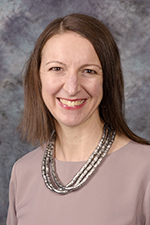
Caroline Quill, MD
Associate Professor of Medicine
Medical Director, Medical Intensive Care Service, Strong Memorial Hospital
Clinician Educator
Thank you for your interest in the University of Rochester Pulmonary & Critical Care fellowship program. My husband (Dr Tim O’Connor, Emergency Medicine) and I accepted faculty positions at URMC in 2013 after a long haul of training in Philadelphia. One of the major attractions of this institution was the variety of paths for career advancement at the University of Rochester. Rochester places a genuine emphasis on teaching and scholarship. In fact, there is a promotional track for teacher/scholars as well as for clinician scientists. But if NIH-funding is your career aspiration, look no further! Our division supports junior physician scientists (with both resources and time) as they transition from fellowship to faculty and prepare to secure independent funding. We also have several NIH funded faculty members at a variety of phases in their academic careers.
I serve our group as the Director of the Medical Intensive Care Unit. I am passionate about providing patient and family centered care in an environment that is nurturing and educational for providers in all roles. Academically, I focus on quality improvement, implementation science, and end-of-life care in the ICU as well as for patients with advanced COPD.
If you can’t find me on the 8th floor, you can usually find me doing or teaching yoga, taking orders from my children, taking admissions from my husband, jumping in cold lakes, mountain biking, and running when my foot does not hurt. Pulmonary and critical care medicine is truly the greatest show on earth – you have chosen well!
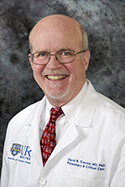
David Trawick, MD, PhD
Professor of Medicine
Rochester was ahead of the curve in providing a rigorous but humane clinical education at the residency level. Our GME was one of the first to receive an “A+” rating for our clinical training programs. However, what truly stands out to me is the degree of collegiality among the faculty and fellows within and between divisions and departments.
Our fellowship enables any fellow to pursue a pulmonary/critical care tailored to their interest and skill sets. We truly set our trainees up for success, whether their goal is to pursue a career as a NIH funded researcher, medical educator, interventional pulmonologist, hospital leader (opportunity to obtain an MPH or MBA are here!), or in community practice.
I think it is important that our fellows learn to effectively teach at the bedside and gain proficiency at presenting at local, regional, and national conferences. All fellows graduate with experience in presenting their work nationally and are simultaneously recognized as excellent teachers at the local level (as evidenced by our domination of faculty and fellow teaching awards.
In additional to my general pulmonary clinic, I follow patients with noninfectious complications of bone marrow transplantation, pulmonary vascular disease, and complications of neuromuscular disease. I also teach broadly – across the medical school and in many other venues – and love interacting with and mentoring trainees at all levels
Surprise fact: Called “Papa Trawick” or “Uncle Dave” for his knack for making all fellows feel like part of his family.
Christina Dony, MD
Assistant Professor of Medicine; Director of Procedural Education, PCCM and CCM Fellowships; Clinician Educator
I'm what they call a lifer – I was born and raised in Rochester, attended the University of Rochester for my undergraduate education, shifted east to Syracuse for medical school, and then happily returned to UR for my residency and fellowship training before joining the faculty in 2017.
My clinical passion is the diagnosis and management of lung nodules and pleural disease. As such, you can generally find me in the procedure suite teaching and performing advanced bronchoscopy (EBUS, Navigational and Robotic Assisted bronchoscopy) and pleural procedures (including chest tubes and indwelling pleural catheters). One of the best parts of my job is getting to spend one-on-one time teaching fellows how to become competent and confidant in performing advanced pulmonary procedures over the course of their three year fellowship.
I am honored to be a part of the Pulmonary Critical Care department at URMC. I genuinely look forward to coming to work every day; I get to care for patients and spend time with colleagues who are not only awe-inspiring with respect to their clinical acumen but are simply wonderful human beings and friends.
The city of Rochester is a great place to live and it is one of the factors that led me to return to Rochester to complete my medical training. There are endless activities all four seasons, its affordable and a great place to raise a family. I have two small children under the age of five and Rochester has been an amazing place to explore with them.
Fun fact: My day is not complete unless I have gone for a run, listened to music and read something non-work related.
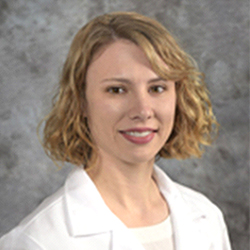
Heather Clark, MD, PhD
Residency / University of Rochester
Hometown / Elmira, NY
The faculty are enthusiastic about teaching and are generous with sharing their diverse interests: from research, to advanced procedures, to complimentary specialties such as palliative care or infectious disease.
You therefore get exposure to many different styles of practice and perspectives on management, and this really strengthens your clinical and academic training.
The best part about this program is the people. Our faculty, co-fellows, residents, APPs and support staff are always a pleasure to work with and there is a great sense of camaraderie and collegiality inside and outside the hospital.